Unit 5 第3课时课文讲解及语法拓展(共44张PPT)2022-2023学年六年级英语下册同步精品课堂(牛津上海版)
文档属性
| 名称 | Unit 5 第3课时课文讲解及语法拓展(共44张PPT)2022-2023学年六年级英语下册同步精品课堂(牛津上海版) |  | |
| 格式 | pptx | ||
| 文件大小 | 7.7MB | ||
| 资源类型 | 教案 | ||
| 版本资源 | 牛津上海版(试用本) | ||
| 科目 | 英语 | ||
| 更新时间 | 2023-04-04 07:46:38 | ||
图片预览

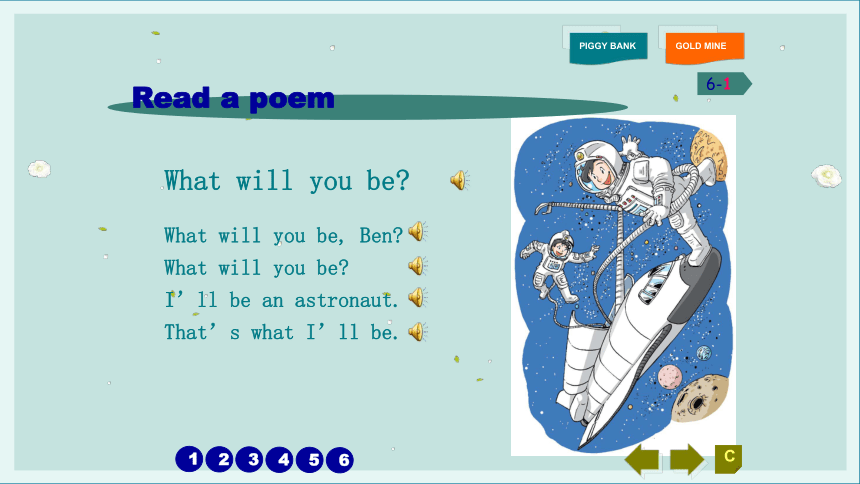
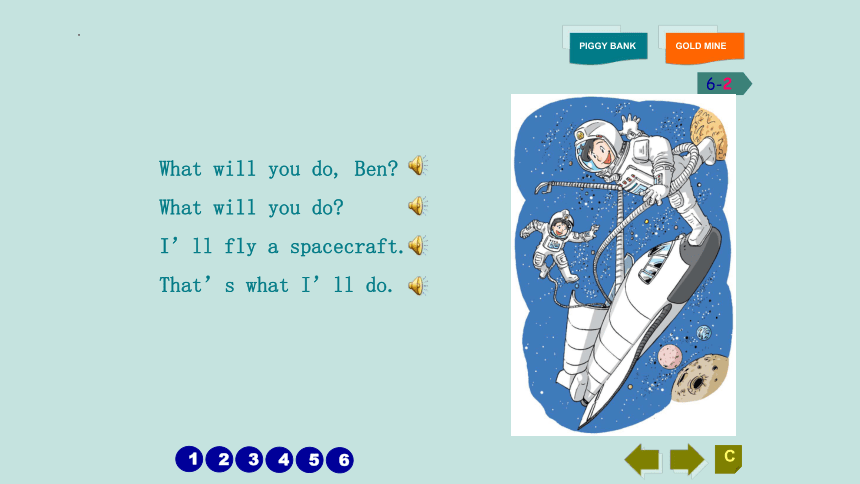
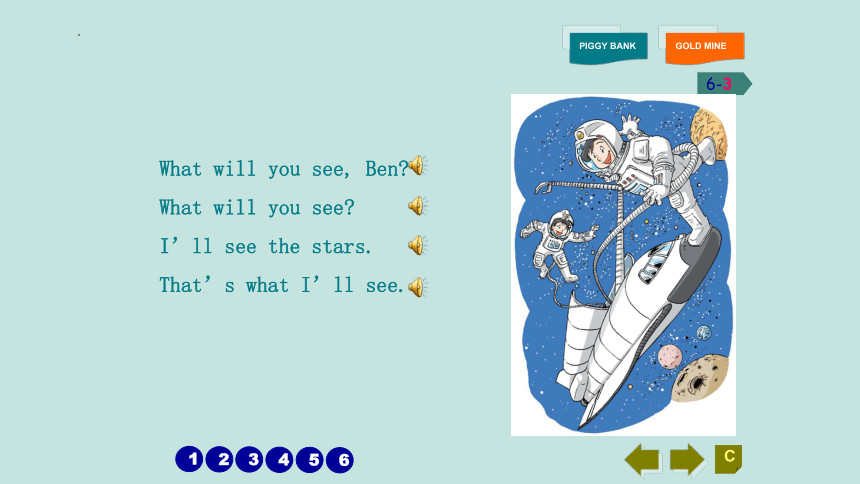

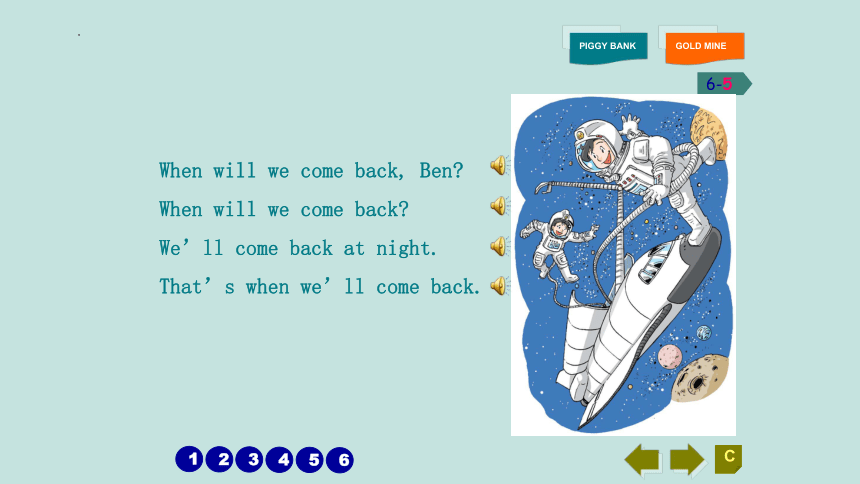


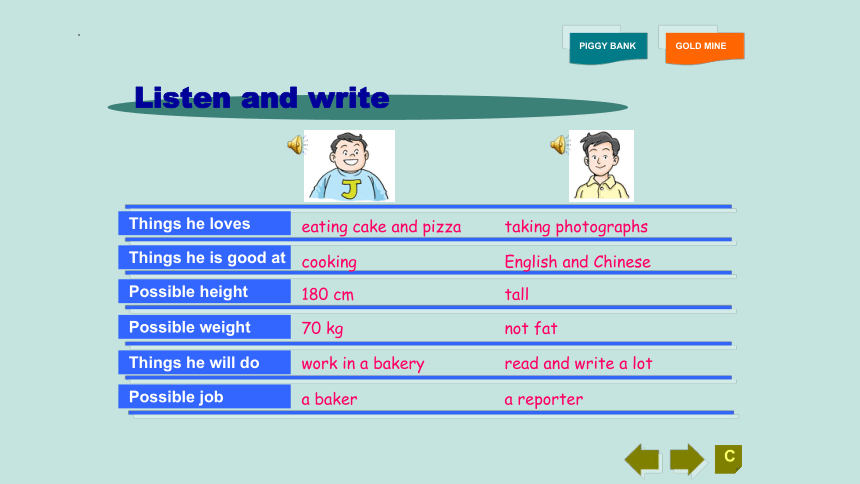
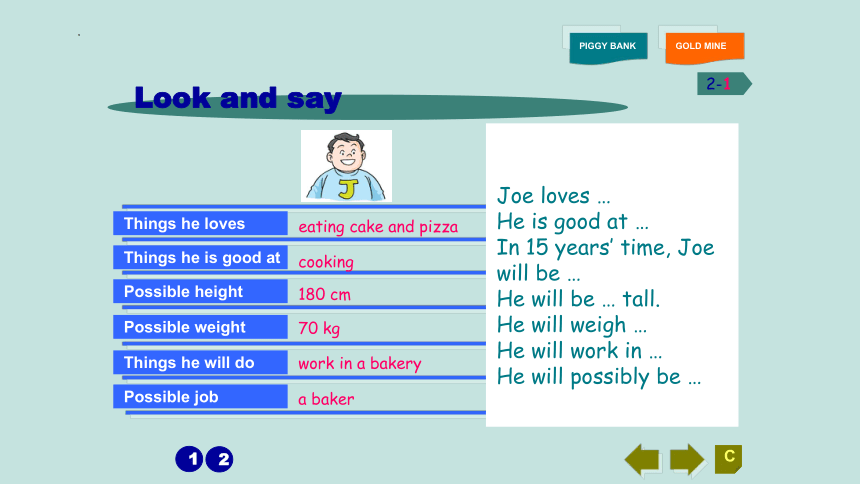
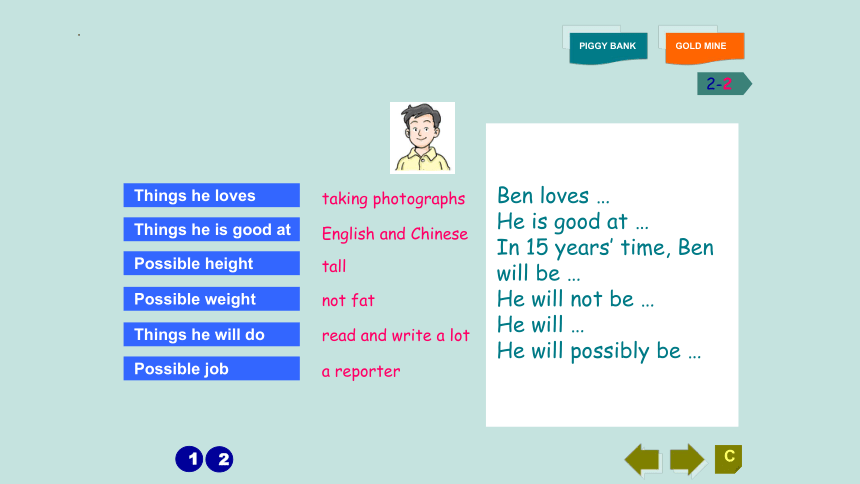
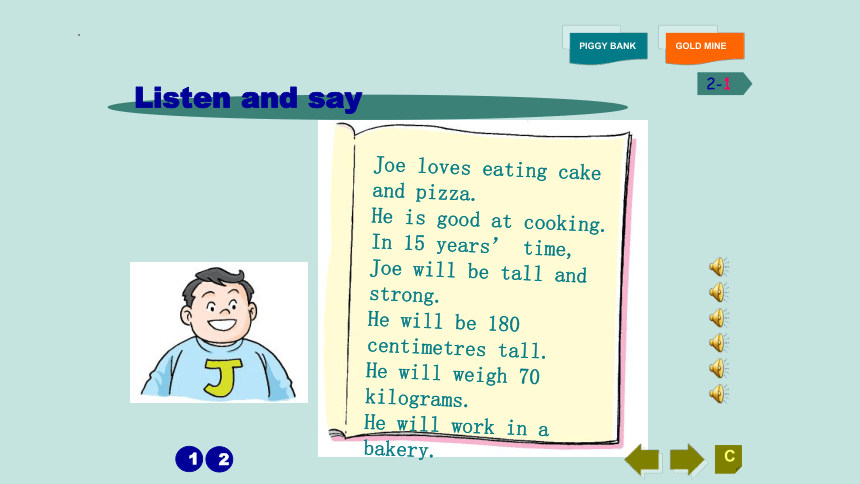
文档简介
(共44张PPT)
What will I be like Episode 3
牛津上海版 英语 六年级 第二学期
Unit 5
Read a poem
PIGGY BANK
GOLD MINE
C
1
2
3
4
6-1
What will you be
What will you be, Ben
What will you be
I’ll be an astronaut.
That’s what I’ll be.
5
6
PIGGY BANK
GOLD MINE
C
1
2
3
4
6-2
What will you do, Ben
What will you do
I’ll fly a spacecraft.
That’s what I’ll do.
5
6
PIGGY BANK
GOLD MINE
C
1
2
3
4
6-3
What will you see, Ben
What will you see
I’ll see the stars.
That’s what I’ll see.
5
6
PIGGY BANK
GOLD MINE
C
1
2
3
4
6-4
Who will go with you, Ben
Who will go with you
You’ll go with me, Kitty.
You’ll go with me.
5
6
PIGGY BANK
GOLD MINE
C
1
2
3
4
6-5
When will we come back, Ben
When will we come back
We’ll come back at night.
That’s when we’ll come back.
5
6
PIGGY BANK
GOLD MINE
C
1
2
3
4
6-6
What will you be
What will you be, Ben
What will you be
I’ll be an astronaut.
That’s what I’ll be.
What will you do, Ben
What will you do
I’ll fly a spacecraft.
That’s what I’ll do.
What will you see, Ben
What will you see
I’ll see the stars.
That’s what I’ll see.
Who will go with you, Ben
Who will go with you
You’ll go with me, Kitty.
You’ll go with me.
When will we come back, Ben
When will we come back
We’ll come back at night.
That’s when we’ll come back.
5
6
Look and learn
PIGGY BANK
GOLD MINE
C
bakery
/ /
report
/ /
Listen and write
PIGGY BANK
GOLD MINE
C
Things he loves
Things he is good at
Possible height
Possible weight
Things he will do
Possible job
eating cake and pizza
cooking
180 cm
70 kg
work in a bakery
a baker
taking photographs
English and Chinese
tall
not fat
read and write a lot
a reporter
Things he loves
Things he is good at
Possible height
Possible weight
Things he will do
Possible job
eating cake and pizza
cooking
180 cm
70 kg
work in a bakery
a baker
Joe loves …
He is good at …
In 15 years’ time, Joe will be …
He will be … tall.
He will weigh …
He will work in …
He will possibly be …
PIGGY BANK
GOLD MINE
C
Look and say
1
2
2-1
PIGGY BANK
GOLD MINE
C
Things he loves
Things he is good at
Possible height
Possible weight
Things he will do
Possible job
taking photographs
English and Chinese
tall
not fat
read and write a lot
a reporter
1
2
2-2
Ben loves …
He is good at …
In 15 years’ time, Ben will be …
He will not be …
He will …
He will possibly be …
PIGGY BANK
GOLD MINE
C
Listen and say
2-1
Joe loves eating cake and pizza.
He is good at cooking.
In 15 years’ time, Joe will be tall and strong.
He will be 180 centimetres tall.
He will weigh 70 kilograms.
He will work in a bakery.
1
2
PIGGY BANK
GOLD MINE
C
2-2
Ben loves taking photographs.
He is good at English and Chinese.
In 15 years’ time, Ben will be tall, but he will not be fat.
He will read and write a lot.
1
2
Ask and answer
PIGGY BANK
GOLD MINE
C
In pairs, talk about what Joe and Ben will be like and what they will possibly be in 15 years’ time.
driver
singer
teacher
dentist
baker
secretary
policeman
pilot
doctor
reporter
cook
astronaut
Jobs
PIGGY BANK
GOLD MINE
C
S1: What will Joe be like in 15 years’ time
S2: He will be _____.
He will be _____ tall.
He will weight _____ kilograms.
S1: What will he possibly be in 15 years’ time
S2: He will possibly be a/an _____.
S1: Yes, I agree./No, I don’t agree. He will possibly be a/an _____.
Jobs
driver
singer
teacher
dentist
baker
secretary
policeman
pilot
doctor
reporter
cook
astronaut
Write a poem
PIGGY BANK
GOLD MINE
C
What will you be
What will you be, _____
What will you be
I’ll be _____.
That’s what I’ll be.
What will you do, _____
What will you do
I’ll ______.
That’s what I’ll do.
What will you see, _____
What will you see
I’ll see _____.
That’s what I’ll see.
Who will go with you, _____
Who will go with you
_____’ll go with me.
You’ll go with me.
When will we come back, _____
When will we come back
We’ll come back _____.
That’s when we’ll come back.
PIGGY BANK
GOLD MINE
C
Talk and write
With a classmate, talk like this:
S1: What do you love
S2: I love ________________.
S1: What are you good at
S2: I am _________________.
S1: What will you be like in 15 years’ time
S2: I will _______. I will be _______ tall. I will weigh _______ kilograms.
S1: What job will you do
S2: I will _________________.
1
2
2-1
PIGGY BANK
GOLD MINE
C
Now, write about your classmate, like this:
1
2
2-2
____ loves ____________.
He/she is good at _______ ________.
In 15 years’ time, ____ will be ________. He/She will be _______ tall. He/She will weigh _________. He/ She will ______________.
He/She will possibly be a/an ______.
for
动词
实义动词
Be动词
助动词
情态
动词
Take go have play speak
am is are was were
will have
can/could may/might must
have to will/would
二、语法讲解
1、情态动词
since
for
Can
表能力,“能够”
翻译:我能吃四碗饭
I can eat four bowls of rice.
for
Can
(2)表允许,“可以”
翻译:我现在可以回家了吗?
Can I go home now
since
for
May/might
表允许,“可以”=can, 但语气更委婉
It’s so hot.
May/ might I have a drink
No, you mustn’t.
since
for
“必须,一定”,主观上
Must
I must conquer English !
You can do it !
for
I have to
finish all the
homework
tonight
Hey, Sunny~
Tomorrow
is
Weekends,
let’s play
tennis after
class.
Have to
“必须,不得不”,客观上
since
will/would
I will not let myself down.
表示意愿,“愿意”
Would you like to go shopping
with me today .
疑问句中,表有礼貌的请求
since
for
【例题精讲】
--Could I borrow your dictionary
--Of course you ____________.
A. can B. must C. should D. will
【例题精讲】
--Mary, __________you speak Chinese
--Yes, only a little.
A. must B. need C. may D. can
【例题精讲】
--Must we finish giving out the posters today
--Yes, we _______. It can't be put off any longer.
can B. may C. must D. have to
A
D
C
辨析词义,是不是
发现除了Ta其他选项
的意思都怪怪的呢
只有谁是“能”
的意思呀?
掌握情态动词
先翻译!!!!
1)动词的分类
(实义动词、be动词、情态动词、助动词)
2)各种情态动词的用法和区别
情态动词的掌握点在于语境,而语境的判断根据
翻译词义即可清楚情态动词用得是否得当
2、一般将来时
一般将来时表示在将来某个时间要发生的动作或存在的状态。
A) 一般将来时的构成 (1)由助动词“shall/will+动词原形”或“be going to+动词原形”构成,shall用于第一人称,will用于第二、三人称。在美国英语中,在陈述句中不论什么人称一律用will。 e. g. She will be a teacher next year.明年她将成为一名老师。 (2)一般将来时的否定和疑问形式: ①一般将来时的否定形式是will not缩写为won’t,shall not缩写为shan't,在“be going to+动词原形”结构中,其否定形式为在be后加not。 e. g. He won't come here tomorrow. 他明天不会来这儿。 ②一般将来时的疑问形式是把will( shall)提到主语前,若是“be going to+动词原形”结构,其疑问形式是将be提到主语前。 e. g. Will she go to the bookshop tomorrow 她明天去书店吗?
一般将来时的陈述句、否定句、疑问句及简单回答形式以go为例见下表:
陈述句 否定句 疑问句 简单回答
I/Weshall go there. You/He/She/They will go there. I/We shall not go there.I/Weshan't go there. You/He/She/They will not go there.You/He/She/Theywon'tgo there. Shall I/we go there Will you/he/she/ they go there Yes, I/we shall/will.No, I/we shan't/won't.Yes, he/she/theywill.No, he/she/they won't.
B) 一般将来时的用法
(1)一般将来时表示将来某个时间将要发生的动作或存在的状态。常与表示将来的时间状语tomorrow, next week/month/year,in three days等词连用。
e. g. I will have a party next Saturday. I hope you can come.下周六我将举行一次派对,我希望你能来。If it doesn't rain tomorrow, we are going to the Summer Palace.如果明天不下雨,我们就去颐和园。When will the train arrive 火车什么时间到?
(2)表示预料中将要发生的动作或情况。
e. g. You will feel better after having this medicine.你吃了这药就会感觉好一些。
I think it will rain this afternoon.我今天下午会下雨。
(3)表示将来经常或反复发生的动作。
e. g. I'll come and see you every Sunday next year.明年我将每周日来看你。
We shall come to work in this factory every year.我们将每年来到这个工厂劳动。
(4)“be going to+动词原形”结构表示现在打算在最近或将来要做的事,或表示说话人根据已有的迹象认为可能要发生的事情。
e. g. It is going to rain this afternoon.今天下午要下雨。Are you going to have a new subject next year
明年你们将学一门新学科吗?
1.Bayles is only ten years old, but he ________ take good care of his little sister.
A.could B.can C.may D.must
2.— Shall we ________ them to the cinema
— Sure.
A.take B.takes C.taking D.to take
3.—Can you cook
—________. I do it for my parents every day.
A.Yes, I can B.No, I can’t C.Yes, I will D.No, I won’t
4.—What are you going to do this Sunday
—I ________ a walk in the countryside.
A.took B.am going to take C.take D.takes
5.People __________ everywhere by plane in the future.
A.travel B.travels C.is traveling D.will travel
6.There ________ two football matches in the sports centre next week.
A.are going to have B.will have C.is going to be D.are going to be
7.—Will there be schools in the future
—No, there ________.
A.isn’t B.won’t C.won’t be D.will be not
8.Alan can ________ the guitar and he ________ a new guitar.
A.play; have B.plays; has C.play; has D.plays; have
9.—When ________ you ________ reading Jane Eyre
—It’s hard to say. I’m busy now.
A.did, finish B.do, finish C.is, finishing D.will, finish
10.In the future, people ________ 4D printers to print anything they want.
A.use B.are using C.will use D.is going to use
随堂练习一
1.B
【详解】句意:Bayles只有十岁,但他能很好地照顾他的小妹妹。
考查情态动词。could能够,can的过去式;can能够;may可能;must必须。根据“Bayles is only ten years old, but he...take good care of his little sister.”可知是指Bayles 能很好地照顾他的小妹妹。根据前句的is可知句子是一般现在时,应用can。故选B。
2.A
【详解】句意:——我们带他们去看电影好吗?——当然。
考查情态动词的用法。shall是情态动词,后接动词原形,故选A。
3.A
【详解】句意:——你会做饭吗?——是的,我会。我每天都为我父母做。
考查一般疑问句的回答。根据“Can you cook ”可知,该句是含有情态动词can的一般疑问句,肯定回答用:Yes, 主语+can.,否定回答用:No, 主语+can’t.;再根据“I do it for my parents every day.”可知,此处要进行肯定回答。故选A。
4.B
【详解】句意:——这周末你打算做什么?——我打算去乡下散步。
考查一般将来时。根据“What are you going to do this Sunday”,可知句子为一般将来时,回答同样用一般将来时。故选B。
5.D
【详解】句意:将来人们将乘飞机到处旅行。
考查一般将来时。根据“ in the future”表示“在将来”,可知句子用一般将来时,故选D。
6.D
【详解】句意:下周体育中心将有两场足球比赛。
考查there be句型的一般将来时用法。根据观察和分析可知题干使用了there be结构。there be结构的一般将来时可用“there will be”和“there is/are going to be”表示,故先排除选项A和B。主语“two football matches”属于复数形式,be动词用are,故选D。
7.B
【详解】句意:——将来会有学校吗?——不,将不会有。
考查疑问句的回答。根据“Will there be schools in the future ”可知,该句是there be句型的一般将来时结构,否定回答要用No, there won’t。故选B。
8.C
【详解】句意:艾伦会弹吉他,他有一把新吉他。
考查情态动词和第三人称单数用法。第一空前有情态动词can,所以空处用动词原形,排除BD;第二空主语是第三人称单数,谓语动词应用三单形式,故选C。
9.D
【详解】句意:——你什么时候读完《简·爱》?——这很难说。我现在很忙。
考查时态。根据“It’s hard to say. I’m busy now.”可知现在在忙,可见还没读完,表示将来的动作用一般将来时will do。故选D。
10.C
【详解】句意:在未来,人们将使用4D打印机打印任何他们想要的东西。
考查时态。根据时间状语“In the future”可知,此处应用一般将来时,谓语动词应用will do或者be going to do,主语“people”是复数,be动词用are,D项错误,故选C。
随堂练习二
11.Bill ________ his teacher next week.
A.will visit B.visit C.visits D.visiting
12.There ________ a home robot for a family in the future, I think.
A.will have B.has C.have D.will be
13.I ________ the shop. Would you like to go with me
A.go to B.went to C.going to D.am going to
14.— Can you play the piano
— ________.
A.Yes, I can B.Sure, I can’t C.No, you can D.No, I can
15.You ________ try your best, or you won’t pass the exam.
A.might B.can C.may D.should
16.Now your father is sleeping so you ________ listen to music.
A.must B.can’t C.can D.need
17.I have my own room in my house, so I ________ do what I want in it.
A.can B.can’t C.might D.might not
18.—Can we eat in the classroom
—________, but we can eat in the dining hall.
A.Yes, we can B.No, we can’t C.Yes, we do D.No, we needn’t
19.—Mum, can you _________ at five tomorrow morning
—OK.
A.wake up me B.wake me up C.woke up me D.woke me up
20.—Must I finish the housework now
—No, you ________. You have enough time to do it.
A.shouldn’t B.mustn’t C.don’t have to D.can’t
11.A
【详解】句意:比尔下周将去拜访他的老师。
考查动词时态。根据“next week”可知,句子是一般将来时:will+动词原形。故选A。
12.D
【详解】句意:我想,未来的家庭里会有一个家用机器人。
考查there be句型。根据“in the future”可知,时态用一般将来时。there be句型不与have/has连用,其一般将来时为there is going to be或there will be。故选D。
13.D
【详解】句意:我要去商店。你想和我一起去吗?
考查动词时态。根据“Would you like to go with me ”可知是邀请对方和自己一起去,说明是打算去商店,应用be going to结构,故选D。
14.A
【详解】句意:——你可以弹钢琴吗?——是的,我可以。
考查一般疑问句。根据“Can you”可知,肯定回答是Yes, I can,否定回答是No, I can’t,故选A。
15.D
【详解】句意:你应该尽全力,否则将不会通过考试。
考查情态动词的辨析。might可能;can能;may可以;should应该。根据“…or you won’t pass the exam.”可知,为了通过考试,应该尽全力。故选D。
16.B
【详解】句意:现在你爸爸在睡觉,所以你不能听音乐。
考查情态动词辨析。must必须;can’t不能;can能,可以;need需要。根据“Now your father is sleeping”可知,爸爸在睡觉,不能听音乐吵到他。故选B。
17.A
【详解】句意:在我家我有我自己的房间,所以我能在里面做我想做的事情。
考查情态动词辨析。can能;can’t不能;might可以;might not不可以。根据“I have my own room in my house”可知应是能做自己想做的事,can语气较强烈,符合语境,故选A。
18.B
【详解】句意:——我们可以在教室里吃东西吗?——不,我们不可以,但我们可以在食堂里吃东西。
考查一般疑问句。根据can we可知,答语应是Yes, we can或No, we can’t。根据“but we can eat in the dining hall”可知,不可以在教室里吃东西,故选B。
19.B
【详解】句意:——妈妈,你能在明天早上5点叫醒我吗?——好的。
考查动词短语。wake up“叫醒”,是“动词+副词”构成的动词短语,代词作宾语时置于动词和副词之间,故排除A和C;再根据空前的“can”可知,此处要用动词原形。故选B。
20.C
【详解】句意:——我必须现在完成家务吗?——不,你不必。你有足够的时间做这件事。
考查情态动词must开头的一般疑问句。shouldn’t不应该;mustn’t不必;don’t have to不需要;can’t不能。情态动词must开头的一般疑问句,肯定回答用must,否定回答用needn’t或don’t have to。故选C。
随堂练习三
21.—Bob speaks English. He ________ be an American.
—Yes, you’re right.
A.should B.must C.can D.need
22.—Alice, jump _________ the rabbit hole. Don’t let us wait long.
—OK, I _________.
A.out of, won’t B.out of, will C.up; will D.up, won’t
23.________ a talent show in our school next week.
A.There will be B.There will have C.There is D.There has
24.There ________ an important meeting tomorrow afternoon.
A.is B.are C.is going to have D.is going to be
25.—Which team ________ the football match
—I’m not sure. The two teams both play well. Let’s wait ans see.
A.wins B.is winning C.to win D.will win
26.I hope you ________ a car ________.
A.will have; of your own B.will have; to your own
C.to have; to my own D.to have; of your own
27.The wind is blowing (吹;刮) hard. There ________ a heavy storm later in the afternoon.
A.will have B.will be C.is going to have D.are going to be
28.There _______ two basketball matches in our school next week, aren’t there
A.are going to have B.is going to be C.will be D.are going to be
29.—Why are you in a hurry, John
—There ________ a basketball match between Class 3 and our class in ten minutes.
A.is going to be B.is going to have C.will have D.will hold
30.—Why are you in such a hurry (匆忙), John
—There ________ a basketball match between Class Three and our class in ten minutes.
A.is going to have B.is going to be C.will have D.will hold
21.B
【详解】句意:——Bob说英语。他一定是一个美国人。——是的,你是对的。
考查情态动词。should应该;must必须,一定;can可能;need需要。根据“Bob speaks English.”可知,此处表肯定的推测,用must,故选B。
22.A
【详解】句意:——Alice,从兔子洞里跳出来,不要让我们等太久。——好的,我不会的。
考查动词短语及否定回答。out of从……出来;up向上。根据“Don’t let us wait long.”可知是要求跳出来,不要让人久等,故用jump out of;“Don’t let us wait long.”是否定句,其回答应是OK, I won’t。答句中I won’t意思是I won’t let you wait long。故选A。
23.A
【详解】句意:下周我们学校将举行才艺表演。
考查There be句型的一般将来时。根据“next week”可知,此句应用一般将来时,排除C;There be句型不能和have连用,排除B和D。故选A。
24.D
【详解】句意:明天下午有一个重要的会议。
考查there be句型和时态。句子是there be结构,根据“tomorrow afternoon”可知用一般将来时,there be句型的一般将来时为there is/are going to be或there will be。故选D。
25.D
【详解】句意:——哪个队将赢得这场足球赛?——我不确定。这两个队都打得很好。让我们拭目以待。
考查动词时态。根据“Let’s wait ans see.”可知,比赛还未开始,时态应用一般将来时,结构为will+动词原形。故选D。
26.A
【详解】句意:我希望你有一辆自己的车。
考查时态以及介词短语。此处是宾语从句,从句中缺少谓语动词,可排除CD两项。本句a car需用所有格修饰,of one’s own“属于某人自己的”,故选A。
27.B
【详解】句意:风吹的很大。下午会有一场暴风雨。
考查时态。根据“...later in the afternoon.”可知此处指将来发生的事情,用一般将来时,There be句型的一般将来时是There will be或者There is/are going to be。根据结构排除A和C。主语是单数,be动词用is。故排除D。故选B。
28.D
【详解】句意:下周我们学校会有两场篮球比赛,是吗?
考查there be句型的一般将来时。根据“There”可知此处是There be句型,再由“next week”可知要用一般将来时;there be句型的一般将来时结构为There will be或There is/are going to be,由“aren’t there”可知不用There will be结构,再由“two basketball matches”可知be动词用are。故选D。
29.A
【详解】句意:——约翰,你为什么这么着急?——十分钟后三班和我们班将有一场篮球赛。
考查there be句型的一般将来时。(there) is going to be“将会有”;(there) is going to have形式错误,干扰项;will have“将有”;will hold“将举办”。根据空前的“There”和空后的“in ten minutes”可知,此处考查there be句型的一般将来时,其构成为:there will be/there is going to be。故选A。
30.B
【详解】句意:——约翰,你为什么这么着急?——十分钟后三班和我们班将有一场篮球赛。
考查时态。根据“There ... a basketball match between Class Three and our class”可知,该句为there be句型;再根据“in ten minutes”可知,时态为一般将来时;there be句型与一般将来时连用时,结构为there is/are going to be/will be“某处有……”。结合选项,故选B。
随堂练习四
31.I think life _________ different and beautiful in twenty years’ time.
A.is B.will be C.are D.was
32.The notice says there ________ a sports meeting at the community centre next Saturday.
A.will have B.has C.is going to have D.is going to be
33.Mr. Green can ________ Beijing at 3: 00 p.m. I want to see him.
A.arrives B.arrive C.arrive at D.arrive in
34.There ________ a book sale in our school next month.
A.is going to be B.is going to have C.was D.has
35.— a sports meeting next week because of the bad weather.
—What a pity!
A.There won’t have B.There won’t be
C.There will have D.There will be
36.Mr. Black ________ play the piano and he can also play ________ basketball.
A.can; the B.can’t; / C.can’t; the D.can; /
37.It’s raining, so I ________ stay at home.
A.can’t B.have to C.has to D.am
38.—Why don’t you join the club
—Because I ________ speak English.
A.can B.can’t C.like D.learn
39.—Mum, May I play computer games this afternoon
—No, you ________ finish your homework first.
A.can B.must C.may D.shall
40.Nancy can’t come here, because she ________ do her homework.
A.has to B.can
C.doesn’t have to D.can’t
31.B
【详解】句意:我认为二十年后的生活将是不同的和美丽的。
考查时态。根据“in twenty years’ time”可知,从句时态要用一般将来时,结构为“will+动词原形”。故选B。
32.D
【详解】句意:通知说下周六在社区中心有一场运动会。
考查一般将来时。根据“next Saturday”可知句子为一般将来时,表达“将会有”用there will be或there is/are going to be。故选D。
33.D
【详解】句意:格林先生可以在下午3点到达北京。我想见他。
考查动词。arrives动词第三人称单数;arrive动词原形;arrive at+小地点;arrive in+大地点。根据横线前的can(情态动词)可知,后面接动词原形,又“ Beijing”是大地点。故选D。
34.A
【详解】句意:下个月我们学校将会有一场图书义卖。
考查There be句型的一般将来时。There be句型不能和have/has连用,排除B和D;根据“next month”可知,此句应用一般将来时。故选A。
35.B
【详解】句意:——由于天气不好,下周不会有运动会。—— 真遗憾!
考查there be句型的一般将来时。根据“What a pity!”可知,下周不会开运动会,A和C形式错误,D是肯定句,应用There won’t be“将不会有”。故选B。
36.D
【详解】句意:布莱克先生会弹钢琴,他也会打篮球。
考查情态动词以及冠词辨析。can能够;can’t不能。根据“he can also”以及and可知,前半句说他能弹钢琴。球类前不加任何冠词,故选D。
37.B
【详解】句意:外面在下雨,所以我不得不待在家里。
考查情态动词。can’t不能;have to不得不(表示客观上的要求);has to不得不(have to的三单形式);am是。根据“It’s raining”可知,因为正在下雨,所以客观上不得不呆在家里。主语为I。故选B。
38.B
【详解】句意:——你为什么不加入俱乐部呢?——因为我不会说英语。
考查动词辨析。can会;can’t不会;like喜欢;learn学习。根据“Because I...speak English.”可知,此处强调能力,不会说英语,所以不加入俱乐部。故选B。
39.B
【详解】句意:——妈妈,我今天下午可以玩电脑游戏吗?——不,你必须先完成作业。
考查情态动词。can能;must必须;may可能;shall将要。根据“May I play computer games this afternoon ”结合“No”可知今天下午必须先把作业完成,应用must,故选B。
40.A
【详解】句意:南希不能来这里,因为她要做作业。
考查情态动词。has to不得不;can能够;doesn’t have to不必;can’t不能。根据“Nancy can’t come here, because she…do her homework”可知,不得不做作业,所以不能来,故选A。
随堂练习五
41.We _________ eat in the dinning hall. We can’t eat outside.
A.must B.can C.should D.could
42.I ________ buy the recorder because I had no money with me then.
A.can B.cannot C.could D.couldn’t
43.— Is the woman singing in the next room Ms. Miller
— No, it _________ be her because she went to Shanghai yesterday.
A.mustn’t B.needn’t C.may not D.can’t
44.These animals are in great ________. We must ________ them.
A.dangerous, save B.danger, save C.danger, to save D.dangerous, to save
45.We can eat in the restaurant(餐馆). But we ________ eat anything in the classroom.
A.can’t B.don’t C.aren’t D.didn’t
46.—Must I hand in my homework on Friday
—No, you_________. You can hand in it on Sunday.
A.can’t B.may not C.mustn’t D.needn’t
47.—What’s wrong with you You look sad.
—I’m afraid that the school ________ ask us to stay at home to have online class for another week.
A.must B.can C.should D.may
48.There ________ a meeting this evening.
A.will be going to B.will going to be C.is going to be D.will have
49.________ you________ free next Sunday Shall we go for a picnic in Nanhu Park
A.Will; are B.Will; be C.Do; be D.Are; be
50.Jason can ________ English well and he often ________ “hello” to us.
A.speak; tells B.speak; says C.tell; talks D.speaks; says
41.A【详解】句意:我们必须在餐厅吃饭。我们不能在外面吃饭。
考查情态动词辨析。must必须;can能够;should应该;could可以。根据“We can’t eat outside”可知,不能在外面吃,必须在餐厅吃,故选A。
42.D【详解】句意:那时我买不了录音机,因为我身上没有钱。
考查情态动词。can“能”;cannot“不能”;could“能”,过去式;couldn’t“不能”,过去式。当can表示能力时,过去式是could。根据“because I had no money with me then.”可知,没有钱,买不了录音机,且由“had”可知是一般过去时。故选D。
43.D【详解】句意:——在隔壁唱歌的女人是Miller女士吗?——不,不可能是她,因为她昨天去上海了。
考查情态动词的用法。mustn’t禁止;needn’t不需要;may not可能不会;can’t不可能,表示有把握的否定推测。根据“because she went to Shanghai yesterday”可知,她昨天去上海了,不可能是她。故选D。
44.B【详解】句意:这些动物处于极大的危险之中。我们必须拯救它们。
考查词义辨析以及情态动词后接动词原形。dangerous危险的,形容词;danger危险,名词。in danger“处于危险之中”;情态动词must后接动词原形,故选B。
45.A【详解】句意:我们可以在餐厅吃饭。但是我们不能在教室里吃任何东西。
考查情态动词。can’t不能;don’t不……;aren’t不是;didn’t不……。根据“We can eat in the restaurant(餐馆)”可知此处是表示不能在教室里吃任何东西。应用can’t。故选A。
46.D【详解】句意:——我必须在星期五交作业吗?——不,你不必。你可以在星期天交。
考查must的一般疑问句。can’t不能;may not可能不会;mustn’t不必;needn’t不需要。以must开头的一般疑问句,肯定回答用must,否定回答用needn’t或don’t/doesn’t have to。故选D。
47.D
【详解】句意:—— 你怎么了?你看起来很伤心。—— 恐怕学校可能会要求我们再待在家里上一周网课。
考查情态动词。must一定,肯定,必须;can能,会;should应该;may也许,可能。根据“I’m afraid that the school…ask us to stay at home to have online class for another week.”可知,表示不确定的推测,应用may。故选D。
48.C
【详解】句意:今天晚上将有一个会议。
考查there be句型的时态。根据“There…a meeting this evening.”可知,句子是there be句型。由“this evening”可知,句子时态用一般将来时,there be句型的一般将来时结构为there will be或there is/are going to be;结合选项可知C选项符合题意,故选C。
49.B
【详解】句意:下周日你有空吗?我们去南湖公园野餐好吗?
考查一般将来时。根据句中“next Sunday”可知句子时态是一般将来时,故可先排除选项C和D。句首用“will”,其后动词要用原形,故选B。
50.B
【详解】句意:杰森能把英语说得很好,并且他经常对我们说“Hello”。
考查动词辨析和主谓一致。speak说,后常接一门语言;tell告诉;says说,后常接说的具体内容,此处为第三人称单数形式;talks说,强调说这个动作,此处为第三人称单数形式。根据“English”可知,speak English“说英语”,根据“can”可知,其后应接动词原形,故排除选项C和D;根据“‘hello’ to us”可知,此处表示说的具体内容,故第二空应用say,由于主语he为第三人称单数,句子时态为一般现在时,故谓语动词应用三单形式,第二空应用says。故选B。
愿君皆有所获,皆有所得
What will I be like Episode 3
牛津上海版 英语 六年级 第二学期
Unit 5
Read a poem
PIGGY BANK
GOLD MINE
C
1
2
3
4
6-1
What will you be
What will you be, Ben
What will you be
I’ll be an astronaut.
That’s what I’ll be.
5
6
PIGGY BANK
GOLD MINE
C
1
2
3
4
6-2
What will you do, Ben
What will you do
I’ll fly a spacecraft.
That’s what I’ll do.
5
6
PIGGY BANK
GOLD MINE
C
1
2
3
4
6-3
What will you see, Ben
What will you see
I’ll see the stars.
That’s what I’ll see.
5
6
PIGGY BANK
GOLD MINE
C
1
2
3
4
6-4
Who will go with you, Ben
Who will go with you
You’ll go with me, Kitty.
You’ll go with me.
5
6
PIGGY BANK
GOLD MINE
C
1
2
3
4
6-5
When will we come back, Ben
When will we come back
We’ll come back at night.
That’s when we’ll come back.
5
6
PIGGY BANK
GOLD MINE
C
1
2
3
4
6-6
What will you be
What will you be, Ben
What will you be
I’ll be an astronaut.
That’s what I’ll be.
What will you do, Ben
What will you do
I’ll fly a spacecraft.
That’s what I’ll do.
What will you see, Ben
What will you see
I’ll see the stars.
That’s what I’ll see.
Who will go with you, Ben
Who will go with you
You’ll go with me, Kitty.
You’ll go with me.
When will we come back, Ben
When will we come back
We’ll come back at night.
That’s when we’ll come back.
5
6
Look and learn
PIGGY BANK
GOLD MINE
C
bakery
/ /
report
/ /
Listen and write
PIGGY BANK
GOLD MINE
C
Things he loves
Things he is good at
Possible height
Possible weight
Things he will do
Possible job
eating cake and pizza
cooking
180 cm
70 kg
work in a bakery
a baker
taking photographs
English and Chinese
tall
not fat
read and write a lot
a reporter
Things he loves
Things he is good at
Possible height
Possible weight
Things he will do
Possible job
eating cake and pizza
cooking
180 cm
70 kg
work in a bakery
a baker
Joe loves …
He is good at …
In 15 years’ time, Joe will be …
He will be … tall.
He will weigh …
He will work in …
He will possibly be …
PIGGY BANK
GOLD MINE
C
Look and say
1
2
2-1
PIGGY BANK
GOLD MINE
C
Things he loves
Things he is good at
Possible height
Possible weight
Things he will do
Possible job
taking photographs
English and Chinese
tall
not fat
read and write a lot
a reporter
1
2
2-2
Ben loves …
He is good at …
In 15 years’ time, Ben will be …
He will not be …
He will …
He will possibly be …
PIGGY BANK
GOLD MINE
C
Listen and say
2-1
Joe loves eating cake and pizza.
He is good at cooking.
In 15 years’ time, Joe will be tall and strong.
He will be 180 centimetres tall.
He will weigh 70 kilograms.
He will work in a bakery.
1
2
PIGGY BANK
GOLD MINE
C
2-2
Ben loves taking photographs.
He is good at English and Chinese.
In 15 years’ time, Ben will be tall, but he will not be fat.
He will read and write a lot.
1
2
Ask and answer
PIGGY BANK
GOLD MINE
C
In pairs, talk about what Joe and Ben will be like and what they will possibly be in 15 years’ time.
driver
singer
teacher
dentist
baker
secretary
policeman
pilot
doctor
reporter
cook
astronaut
Jobs
PIGGY BANK
GOLD MINE
C
S1: What will Joe be like in 15 years’ time
S2: He will be _____.
He will be _____ tall.
He will weight _____ kilograms.
S1: What will he possibly be in 15 years’ time
S2: He will possibly be a/an _____.
S1: Yes, I agree./No, I don’t agree. He will possibly be a/an _____.
Jobs
driver
singer
teacher
dentist
baker
secretary
policeman
pilot
doctor
reporter
cook
astronaut
Write a poem
PIGGY BANK
GOLD MINE
C
What will you be
What will you be, _____
What will you be
I’ll be _____.
That’s what I’ll be.
What will you do, _____
What will you do
I’ll ______.
That’s what I’ll do.
What will you see, _____
What will you see
I’ll see _____.
That’s what I’ll see.
Who will go with you, _____
Who will go with you
_____’ll go with me.
You’ll go with me.
When will we come back, _____
When will we come back
We’ll come back _____.
That’s when we’ll come back.
PIGGY BANK
GOLD MINE
C
Talk and write
With a classmate, talk like this:
S1: What do you love
S2: I love ________________.
S1: What are you good at
S2: I am _________________.
S1: What will you be like in 15 years’ time
S2: I will _______. I will be _______ tall. I will weigh _______ kilograms.
S1: What job will you do
S2: I will _________________.
1
2
2-1
PIGGY BANK
GOLD MINE
C
Now, write about your classmate, like this:
1
2
2-2
____ loves ____________.
He/she is good at _______ ________.
In 15 years’ time, ____ will be ________. He/She will be _______ tall. He/She will weigh _________. He/ She will ______________.
He/She will possibly be a/an ______.
for
动词
实义动词
Be动词
助动词
情态
动词
Take go have play speak
am is are was were
will have
can/could may/might must
have to will/would
二、语法讲解
1、情态动词
since
for
Can
表能力,“能够”
翻译:我能吃四碗饭
I can eat four bowls of rice.
for
Can
(2)表允许,“可以”
翻译:我现在可以回家了吗?
Can I go home now
since
for
May/might
表允许,“可以”=can, 但语气更委婉
It’s so hot.
May/ might I have a drink
No, you mustn’t.
since
for
“必须,一定”,主观上
Must
I must conquer English !
You can do it !
for
I have to
finish all the
homework
tonight
Hey, Sunny~
Tomorrow
is
Weekends,
let’s play
tennis after
class.
Have to
“必须,不得不”,客观上
since
will/would
I will not let myself down.
表示意愿,“愿意”
Would you like to go shopping
with me today .
疑问句中,表有礼貌的请求
since
for
【例题精讲】
--Could I borrow your dictionary
--Of course you ____________.
A. can B. must C. should D. will
【例题精讲】
--Mary, __________you speak Chinese
--Yes, only a little.
A. must B. need C. may D. can
【例题精讲】
--Must we finish giving out the posters today
--Yes, we _______. It can't be put off any longer.
can B. may C. must D. have to
A
D
C
辨析词义,是不是
发现除了Ta其他选项
的意思都怪怪的呢
只有谁是“能”
的意思呀?
掌握情态动词
先翻译!!!!
1)动词的分类
(实义动词、be动词、情态动词、助动词)
2)各种情态动词的用法和区别
情态动词的掌握点在于语境,而语境的判断根据
翻译词义即可清楚情态动词用得是否得当
2、一般将来时
一般将来时表示在将来某个时间要发生的动作或存在的状态。
A) 一般将来时的构成 (1)由助动词“shall/will+动词原形”或“be going to+动词原形”构成,shall用于第一人称,will用于第二、三人称。在美国英语中,在陈述句中不论什么人称一律用will。 e. g. She will be a teacher next year.明年她将成为一名老师。 (2)一般将来时的否定和疑问形式: ①一般将来时的否定形式是will not缩写为won’t,shall not缩写为shan't,在“be going to+动词原形”结构中,其否定形式为在be后加not。 e. g. He won't come here tomorrow. 他明天不会来这儿。 ②一般将来时的疑问形式是把will( shall)提到主语前,若是“be going to+动词原形”结构,其疑问形式是将be提到主语前。 e. g. Will she go to the bookshop tomorrow 她明天去书店吗?
一般将来时的陈述句、否定句、疑问句及简单回答形式以go为例见下表:
陈述句 否定句 疑问句 简单回答
I/Weshall go there. You/He/She/They will go there. I/We shall not go there.I/Weshan't go there. You/He/She/They will not go there.You/He/She/Theywon'tgo there. Shall I/we go there Will you/he/she/ they go there Yes, I/we shall/will.No, I/we shan't/won't.Yes, he/she/theywill.No, he/she/they won't.
B) 一般将来时的用法
(1)一般将来时表示将来某个时间将要发生的动作或存在的状态。常与表示将来的时间状语tomorrow, next week/month/year,in three days等词连用。
e. g. I will have a party next Saturday. I hope you can come.下周六我将举行一次派对,我希望你能来。If it doesn't rain tomorrow, we are going to the Summer Palace.如果明天不下雨,我们就去颐和园。When will the train arrive 火车什么时间到?
(2)表示预料中将要发生的动作或情况。
e. g. You will feel better after having this medicine.你吃了这药就会感觉好一些。
I think it will rain this afternoon.我今天下午会下雨。
(3)表示将来经常或反复发生的动作。
e. g. I'll come and see you every Sunday next year.明年我将每周日来看你。
We shall come to work in this factory every year.我们将每年来到这个工厂劳动。
(4)“be going to+动词原形”结构表示现在打算在最近或将来要做的事,或表示说话人根据已有的迹象认为可能要发生的事情。
e. g. It is going to rain this afternoon.今天下午要下雨。Are you going to have a new subject next year
明年你们将学一门新学科吗?
1.Bayles is only ten years old, but he ________ take good care of his little sister.
A.could B.can C.may D.must
2.— Shall we ________ them to the cinema
— Sure.
A.take B.takes C.taking D.to take
3.—Can you cook
—________. I do it for my parents every day.
A.Yes, I can B.No, I can’t C.Yes, I will D.No, I won’t
4.—What are you going to do this Sunday
—I ________ a walk in the countryside.
A.took B.am going to take C.take D.takes
5.People __________ everywhere by plane in the future.
A.travel B.travels C.is traveling D.will travel
6.There ________ two football matches in the sports centre next week.
A.are going to have B.will have C.is going to be D.are going to be
7.—Will there be schools in the future
—No, there ________.
A.isn’t B.won’t C.won’t be D.will be not
8.Alan can ________ the guitar and he ________ a new guitar.
A.play; have B.plays; has C.play; has D.plays; have
9.—When ________ you ________ reading Jane Eyre
—It’s hard to say. I’m busy now.
A.did, finish B.do, finish C.is, finishing D.will, finish
10.In the future, people ________ 4D printers to print anything they want.
A.use B.are using C.will use D.is going to use
随堂练习一
1.B
【详解】句意:Bayles只有十岁,但他能很好地照顾他的小妹妹。
考查情态动词。could能够,can的过去式;can能够;may可能;must必须。根据“Bayles is only ten years old, but he...take good care of his little sister.”可知是指Bayles 能很好地照顾他的小妹妹。根据前句的is可知句子是一般现在时,应用can。故选B。
2.A
【详解】句意:——我们带他们去看电影好吗?——当然。
考查情态动词的用法。shall是情态动词,后接动词原形,故选A。
3.A
【详解】句意:——你会做饭吗?——是的,我会。我每天都为我父母做。
考查一般疑问句的回答。根据“Can you cook ”可知,该句是含有情态动词can的一般疑问句,肯定回答用:Yes, 主语+can.,否定回答用:No, 主语+can’t.;再根据“I do it for my parents every day.”可知,此处要进行肯定回答。故选A。
4.B
【详解】句意:——这周末你打算做什么?——我打算去乡下散步。
考查一般将来时。根据“What are you going to do this Sunday”,可知句子为一般将来时,回答同样用一般将来时。故选B。
5.D
【详解】句意:将来人们将乘飞机到处旅行。
考查一般将来时。根据“ in the future”表示“在将来”,可知句子用一般将来时,故选D。
6.D
【详解】句意:下周体育中心将有两场足球比赛。
考查there be句型的一般将来时用法。根据观察和分析可知题干使用了there be结构。there be结构的一般将来时可用“there will be”和“there is/are going to be”表示,故先排除选项A和B。主语“two football matches”属于复数形式,be动词用are,故选D。
7.B
【详解】句意:——将来会有学校吗?——不,将不会有。
考查疑问句的回答。根据“Will there be schools in the future ”可知,该句是there be句型的一般将来时结构,否定回答要用No, there won’t。故选B。
8.C
【详解】句意:艾伦会弹吉他,他有一把新吉他。
考查情态动词和第三人称单数用法。第一空前有情态动词can,所以空处用动词原形,排除BD;第二空主语是第三人称单数,谓语动词应用三单形式,故选C。
9.D
【详解】句意:——你什么时候读完《简·爱》?——这很难说。我现在很忙。
考查时态。根据“It’s hard to say. I’m busy now.”可知现在在忙,可见还没读完,表示将来的动作用一般将来时will do。故选D。
10.C
【详解】句意:在未来,人们将使用4D打印机打印任何他们想要的东西。
考查时态。根据时间状语“In the future”可知,此处应用一般将来时,谓语动词应用will do或者be going to do,主语“people”是复数,be动词用are,D项错误,故选C。
随堂练习二
11.Bill ________ his teacher next week.
A.will visit B.visit C.visits D.visiting
12.There ________ a home robot for a family in the future, I think.
A.will have B.has C.have D.will be
13.I ________ the shop. Would you like to go with me
A.go to B.went to C.going to D.am going to
14.— Can you play the piano
— ________.
A.Yes, I can B.Sure, I can’t C.No, you can D.No, I can
15.You ________ try your best, or you won’t pass the exam.
A.might B.can C.may D.should
16.Now your father is sleeping so you ________ listen to music.
A.must B.can’t C.can D.need
17.I have my own room in my house, so I ________ do what I want in it.
A.can B.can’t C.might D.might not
18.—Can we eat in the classroom
—________, but we can eat in the dining hall.
A.Yes, we can B.No, we can’t C.Yes, we do D.No, we needn’t
19.—Mum, can you _________ at five tomorrow morning
—OK.
A.wake up me B.wake me up C.woke up me D.woke me up
20.—Must I finish the housework now
—No, you ________. You have enough time to do it.
A.shouldn’t B.mustn’t C.don’t have to D.can’t
11.A
【详解】句意:比尔下周将去拜访他的老师。
考查动词时态。根据“next week”可知,句子是一般将来时:will+动词原形。故选A。
12.D
【详解】句意:我想,未来的家庭里会有一个家用机器人。
考查there be句型。根据“in the future”可知,时态用一般将来时。there be句型不与have/has连用,其一般将来时为there is going to be或there will be。故选D。
13.D
【详解】句意:我要去商店。你想和我一起去吗?
考查动词时态。根据“Would you like to go with me ”可知是邀请对方和自己一起去,说明是打算去商店,应用be going to结构,故选D。
14.A
【详解】句意:——你可以弹钢琴吗?——是的,我可以。
考查一般疑问句。根据“Can you”可知,肯定回答是Yes, I can,否定回答是No, I can’t,故选A。
15.D
【详解】句意:你应该尽全力,否则将不会通过考试。
考查情态动词的辨析。might可能;can能;may可以;should应该。根据“…or you won’t pass the exam.”可知,为了通过考试,应该尽全力。故选D。
16.B
【详解】句意:现在你爸爸在睡觉,所以你不能听音乐。
考查情态动词辨析。must必须;can’t不能;can能,可以;need需要。根据“Now your father is sleeping”可知,爸爸在睡觉,不能听音乐吵到他。故选B。
17.A
【详解】句意:在我家我有我自己的房间,所以我能在里面做我想做的事情。
考查情态动词辨析。can能;can’t不能;might可以;might not不可以。根据“I have my own room in my house”可知应是能做自己想做的事,can语气较强烈,符合语境,故选A。
18.B
【详解】句意:——我们可以在教室里吃东西吗?——不,我们不可以,但我们可以在食堂里吃东西。
考查一般疑问句。根据can we可知,答语应是Yes, we can或No, we can’t。根据“but we can eat in the dining hall”可知,不可以在教室里吃东西,故选B。
19.B
【详解】句意:——妈妈,你能在明天早上5点叫醒我吗?——好的。
考查动词短语。wake up“叫醒”,是“动词+副词”构成的动词短语,代词作宾语时置于动词和副词之间,故排除A和C;再根据空前的“can”可知,此处要用动词原形。故选B。
20.C
【详解】句意:——我必须现在完成家务吗?——不,你不必。你有足够的时间做这件事。
考查情态动词must开头的一般疑问句。shouldn’t不应该;mustn’t不必;don’t have to不需要;can’t不能。情态动词must开头的一般疑问句,肯定回答用must,否定回答用needn’t或don’t have to。故选C。
随堂练习三
21.—Bob speaks English. He ________ be an American.
—Yes, you’re right.
A.should B.must C.can D.need
22.—Alice, jump _________ the rabbit hole. Don’t let us wait long.
—OK, I _________.
A.out of, won’t B.out of, will C.up; will D.up, won’t
23.________ a talent show in our school next week.
A.There will be B.There will have C.There is D.There has
24.There ________ an important meeting tomorrow afternoon.
A.is B.are C.is going to have D.is going to be
25.—Which team ________ the football match
—I’m not sure. The two teams both play well. Let’s wait ans see.
A.wins B.is winning C.to win D.will win
26.I hope you ________ a car ________.
A.will have; of your own B.will have; to your own
C.to have; to my own D.to have; of your own
27.The wind is blowing (吹;刮) hard. There ________ a heavy storm later in the afternoon.
A.will have B.will be C.is going to have D.are going to be
28.There _______ two basketball matches in our school next week, aren’t there
A.are going to have B.is going to be C.will be D.are going to be
29.—Why are you in a hurry, John
—There ________ a basketball match between Class 3 and our class in ten minutes.
A.is going to be B.is going to have C.will have D.will hold
30.—Why are you in such a hurry (匆忙), John
—There ________ a basketball match between Class Three and our class in ten minutes.
A.is going to have B.is going to be C.will have D.will hold
21.B
【详解】句意:——Bob说英语。他一定是一个美国人。——是的,你是对的。
考查情态动词。should应该;must必须,一定;can可能;need需要。根据“Bob speaks English.”可知,此处表肯定的推测,用must,故选B。
22.A
【详解】句意:——Alice,从兔子洞里跳出来,不要让我们等太久。——好的,我不会的。
考查动词短语及否定回答。out of从……出来;up向上。根据“Don’t let us wait long.”可知是要求跳出来,不要让人久等,故用jump out of;“Don’t let us wait long.”是否定句,其回答应是OK, I won’t。答句中I won’t意思是I won’t let you wait long。故选A。
23.A
【详解】句意:下周我们学校将举行才艺表演。
考查There be句型的一般将来时。根据“next week”可知,此句应用一般将来时,排除C;There be句型不能和have连用,排除B和D。故选A。
24.D
【详解】句意:明天下午有一个重要的会议。
考查there be句型和时态。句子是there be结构,根据“tomorrow afternoon”可知用一般将来时,there be句型的一般将来时为there is/are going to be或there will be。故选D。
25.D
【详解】句意:——哪个队将赢得这场足球赛?——我不确定。这两个队都打得很好。让我们拭目以待。
考查动词时态。根据“Let’s wait ans see.”可知,比赛还未开始,时态应用一般将来时,结构为will+动词原形。故选D。
26.A
【详解】句意:我希望你有一辆自己的车。
考查时态以及介词短语。此处是宾语从句,从句中缺少谓语动词,可排除CD两项。本句a car需用所有格修饰,of one’s own“属于某人自己的”,故选A。
27.B
【详解】句意:风吹的很大。下午会有一场暴风雨。
考查时态。根据“...later in the afternoon.”可知此处指将来发生的事情,用一般将来时,There be句型的一般将来时是There will be或者There is/are going to be。根据结构排除A和C。主语是单数,be动词用is。故排除D。故选B。
28.D
【详解】句意:下周我们学校会有两场篮球比赛,是吗?
考查there be句型的一般将来时。根据“There”可知此处是There be句型,再由“next week”可知要用一般将来时;there be句型的一般将来时结构为There will be或There is/are going to be,由“aren’t there”可知不用There will be结构,再由“two basketball matches”可知be动词用are。故选D。
29.A
【详解】句意:——约翰,你为什么这么着急?——十分钟后三班和我们班将有一场篮球赛。
考查there be句型的一般将来时。(there) is going to be“将会有”;(there) is going to have形式错误,干扰项;will have“将有”;will hold“将举办”。根据空前的“There”和空后的“in ten minutes”可知,此处考查there be句型的一般将来时,其构成为:there will be/there is going to be。故选A。
30.B
【详解】句意:——约翰,你为什么这么着急?——十分钟后三班和我们班将有一场篮球赛。
考查时态。根据“There ... a basketball match between Class Three and our class”可知,该句为there be句型;再根据“in ten minutes”可知,时态为一般将来时;there be句型与一般将来时连用时,结构为there is/are going to be/will be“某处有……”。结合选项,故选B。
随堂练习四
31.I think life _________ different and beautiful in twenty years’ time.
A.is B.will be C.are D.was
32.The notice says there ________ a sports meeting at the community centre next Saturday.
A.will have B.has C.is going to have D.is going to be
33.Mr. Green can ________ Beijing at 3: 00 p.m. I want to see him.
A.arrives B.arrive C.arrive at D.arrive in
34.There ________ a book sale in our school next month.
A.is going to be B.is going to have C.was D.has
35.— a sports meeting next week because of the bad weather.
—What a pity!
A.There won’t have B.There won’t be
C.There will have D.There will be
36.Mr. Black ________ play the piano and he can also play ________ basketball.
A.can; the B.can’t; / C.can’t; the D.can; /
37.It’s raining, so I ________ stay at home.
A.can’t B.have to C.has to D.am
38.—Why don’t you join the club
—Because I ________ speak English.
A.can B.can’t C.like D.learn
39.—Mum, May I play computer games this afternoon
—No, you ________ finish your homework first.
A.can B.must C.may D.shall
40.Nancy can’t come here, because she ________ do her homework.
A.has to B.can
C.doesn’t have to D.can’t
31.B
【详解】句意:我认为二十年后的生活将是不同的和美丽的。
考查时态。根据“in twenty years’ time”可知,从句时态要用一般将来时,结构为“will+动词原形”。故选B。
32.D
【详解】句意:通知说下周六在社区中心有一场运动会。
考查一般将来时。根据“next Saturday”可知句子为一般将来时,表达“将会有”用there will be或there is/are going to be。故选D。
33.D
【详解】句意:格林先生可以在下午3点到达北京。我想见他。
考查动词。arrives动词第三人称单数;arrive动词原形;arrive at+小地点;arrive in+大地点。根据横线前的can(情态动词)可知,后面接动词原形,又“ Beijing”是大地点。故选D。
34.A
【详解】句意:下个月我们学校将会有一场图书义卖。
考查There be句型的一般将来时。There be句型不能和have/has连用,排除B和D;根据“next month”可知,此句应用一般将来时。故选A。
35.B
【详解】句意:——由于天气不好,下周不会有运动会。—— 真遗憾!
考查there be句型的一般将来时。根据“What a pity!”可知,下周不会开运动会,A和C形式错误,D是肯定句,应用There won’t be“将不会有”。故选B。
36.D
【详解】句意:布莱克先生会弹钢琴,他也会打篮球。
考查情态动词以及冠词辨析。can能够;can’t不能。根据“he can also”以及and可知,前半句说他能弹钢琴。球类前不加任何冠词,故选D。
37.B
【详解】句意:外面在下雨,所以我不得不待在家里。
考查情态动词。can’t不能;have to不得不(表示客观上的要求);has to不得不(have to的三单形式);am是。根据“It’s raining”可知,因为正在下雨,所以客观上不得不呆在家里。主语为I。故选B。
38.B
【详解】句意:——你为什么不加入俱乐部呢?——因为我不会说英语。
考查动词辨析。can会;can’t不会;like喜欢;learn学习。根据“Because I...speak English.”可知,此处强调能力,不会说英语,所以不加入俱乐部。故选B。
39.B
【详解】句意:——妈妈,我今天下午可以玩电脑游戏吗?——不,你必须先完成作业。
考查情态动词。can能;must必须;may可能;shall将要。根据“May I play computer games this afternoon ”结合“No”可知今天下午必须先把作业完成,应用must,故选B。
40.A
【详解】句意:南希不能来这里,因为她要做作业。
考查情态动词。has to不得不;can能够;doesn’t have to不必;can’t不能。根据“Nancy can’t come here, because she…do her homework”可知,不得不做作业,所以不能来,故选A。
随堂练习五
41.We _________ eat in the dinning hall. We can’t eat outside.
A.must B.can C.should D.could
42.I ________ buy the recorder because I had no money with me then.
A.can B.cannot C.could D.couldn’t
43.— Is the woman singing in the next room Ms. Miller
— No, it _________ be her because she went to Shanghai yesterday.
A.mustn’t B.needn’t C.may not D.can’t
44.These animals are in great ________. We must ________ them.
A.dangerous, save B.danger, save C.danger, to save D.dangerous, to save
45.We can eat in the restaurant(餐馆). But we ________ eat anything in the classroom.
A.can’t B.don’t C.aren’t D.didn’t
46.—Must I hand in my homework on Friday
—No, you_________. You can hand in it on Sunday.
A.can’t B.may not C.mustn’t D.needn’t
47.—What’s wrong with you You look sad.
—I’m afraid that the school ________ ask us to stay at home to have online class for another week.
A.must B.can C.should D.may
48.There ________ a meeting this evening.
A.will be going to B.will going to be C.is going to be D.will have
49.________ you________ free next Sunday Shall we go for a picnic in Nanhu Park
A.Will; are B.Will; be C.Do; be D.Are; be
50.Jason can ________ English well and he often ________ “hello” to us.
A.speak; tells B.speak; says C.tell; talks D.speaks; says
41.A【详解】句意:我们必须在餐厅吃饭。我们不能在外面吃饭。
考查情态动词辨析。must必须;can能够;should应该;could可以。根据“We can’t eat outside”可知,不能在外面吃,必须在餐厅吃,故选A。
42.D【详解】句意:那时我买不了录音机,因为我身上没有钱。
考查情态动词。can“能”;cannot“不能”;could“能”,过去式;couldn’t“不能”,过去式。当can表示能力时,过去式是could。根据“because I had no money with me then.”可知,没有钱,买不了录音机,且由“had”可知是一般过去时。故选D。
43.D【详解】句意:——在隔壁唱歌的女人是Miller女士吗?——不,不可能是她,因为她昨天去上海了。
考查情态动词的用法。mustn’t禁止;needn’t不需要;may not可能不会;can’t不可能,表示有把握的否定推测。根据“because she went to Shanghai yesterday”可知,她昨天去上海了,不可能是她。故选D。
44.B【详解】句意:这些动物处于极大的危险之中。我们必须拯救它们。
考查词义辨析以及情态动词后接动词原形。dangerous危险的,形容词;danger危险,名词。in danger“处于危险之中”;情态动词must后接动词原形,故选B。
45.A【详解】句意:我们可以在餐厅吃饭。但是我们不能在教室里吃任何东西。
考查情态动词。can’t不能;don’t不……;aren’t不是;didn’t不……。根据“We can eat in the restaurant(餐馆)”可知此处是表示不能在教室里吃任何东西。应用can’t。故选A。
46.D【详解】句意:——我必须在星期五交作业吗?——不,你不必。你可以在星期天交。
考查must的一般疑问句。can’t不能;may not可能不会;mustn’t不必;needn’t不需要。以must开头的一般疑问句,肯定回答用must,否定回答用needn’t或don’t/doesn’t have to。故选D。
47.D
【详解】句意:—— 你怎么了?你看起来很伤心。—— 恐怕学校可能会要求我们再待在家里上一周网课。
考查情态动词。must一定,肯定,必须;can能,会;should应该;may也许,可能。根据“I’m afraid that the school…ask us to stay at home to have online class for another week.”可知,表示不确定的推测,应用may。故选D。
48.C
【详解】句意:今天晚上将有一个会议。
考查there be句型的时态。根据“There…a meeting this evening.”可知,句子是there be句型。由“this evening”可知,句子时态用一般将来时,there be句型的一般将来时结构为there will be或there is/are going to be;结合选项可知C选项符合题意,故选C。
49.B
【详解】句意:下周日你有空吗?我们去南湖公园野餐好吗?
考查一般将来时。根据句中“next Sunday”可知句子时态是一般将来时,故可先排除选项C和D。句首用“will”,其后动词要用原形,故选B。
50.B
【详解】句意:杰森能把英语说得很好,并且他经常对我们说“Hello”。
考查动词辨析和主谓一致。speak说,后常接一门语言;tell告诉;says说,后常接说的具体内容,此处为第三人称单数形式;talks说,强调说这个动作,此处为第三人称单数形式。根据“English”可知,speak English“说英语”,根据“can”可知,其后应接动词原形,故排除选项C和D;根据“‘hello’ to us”可知,此处表示说的具体内容,故第二空应用say,由于主语he为第三人称单数,句子时态为一般现在时,故谓语动词应用三单形式,第二空应用says。故选B。
愿君皆有所获,皆有所得
同课章节目录
- Module 1 City life
- Unit 1 Great cities in Asia
- Unit 2 At the airport
- Unit 3 Dragon Boat Festival
- Unit 4 Staying healthy
- Module 2 Changes
- Unit 5 What will I be like?
- Unit 6 Seasonal changes
- Unit 7 Travelling in Garden City
- Module 3 The nature world
- Unit 8 Windy weathe
- Unit 9 Sea water and rain wate
- Unit 10 Forests and land
- Unit 11 Controlling fire
